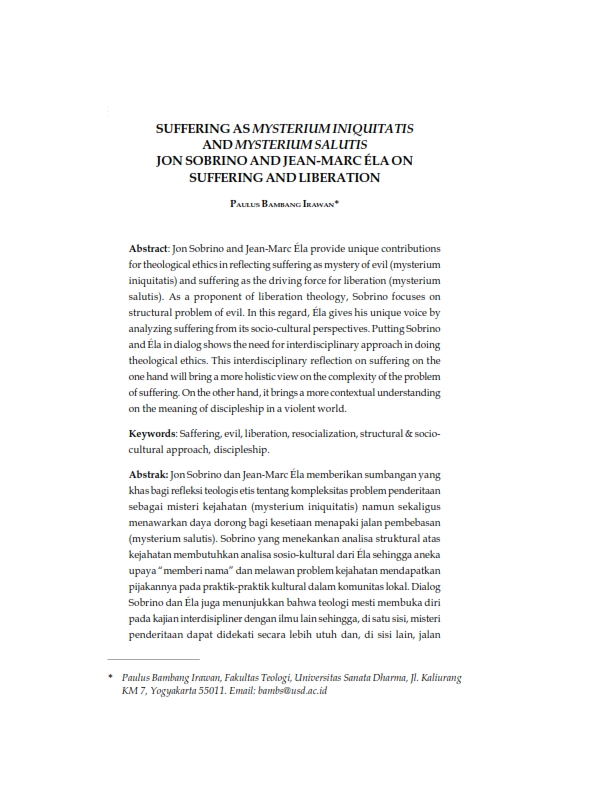Suffering As Mysterium Iniquitatis And Mysterium Salutis Jon Sobrino And Jean-Marc Éla On Suffering And Liberation
Abstract
Abstract: Jon Sobrino and Jean-Marc Éla provide unique contributions for theological ethics in reflecting suffering as mystery of evil (mysterium iniquitatis) and suffering as the driving force for liberation (mysterium salutis). As a proponent of liberation theology, Sobrino focuses on structural problem of evil. In this regard, Éla gives his unique voice by analyzing suffering from its socio-cultural perspectives. Putting Sobrino and Éla in dialog shows the need for interdisciplinary approach in doing theological ethics. This interdisciplinary reflection on suffering on the one hand will bring a more holistic view on the complexity of the problem of suffering. On the other hand, it brings a more contextual understanding on the meaning of discipleship in a violent world.
Keywords: Saffering, evil, liberation, resocialization, structural & socio- cultural approach, discipleship.
Abstrak: Jon Sobrino dan Jean-Marc Éla memberikan sumbangan yang khas bagi refleksi teologis etis tentang kompleksitas problem penderitaan sebagai misteri kejahatan (mysterium iniquitatis) namun sekaligus menawarkan daya dorong bagi kesetiaan menapaki jalan pembebasan (mysterium salutis). Sobrino yang menekankan analisa struktural atas kejahatan membutuhkan analisa sosio-kultural dari Éla sehingga aneka upaya “memberi nama” dan melawan problem kejahatan mendapatkan pijakannya pada praktik-praktik kultural dalam komunitas lokal. Dialog Sobrino dan Éla juga menunjukkan bahwa teologi mesti membuka diri pada kajian interdisipliner dengan ilmu lain sehingga, di satu sisi, misteri penderitaan dapat didekati secara lebih utuh dan, di sisi lain, jalan kemuridan yang muncul karena tanggapan atasnya menjadi lebih kontekstual.
Kata-kata kunci: Penderitaan, kejahatan, pembebasan, resosialisasi, pendekatan struktural, pendekatan sosio-kultural, kemuridan.

DISKURSUS applies the Creative Commons license (CC BY). We allow readers to read, download, copy, distribute, print, search, or link to the full texts of its articles and allow readers to use them for any other lawful purpose. The author must be aware that the article copyrights will be fully transferred to DISKURSUS if the article is accepted to be published in the journal. Once the manuscript has been published, authors are allowed to use their published article under DISKURSUS copyrights. Full information about CC BY can be found here: https://creativecommons.org/licenses/by/4.0/












